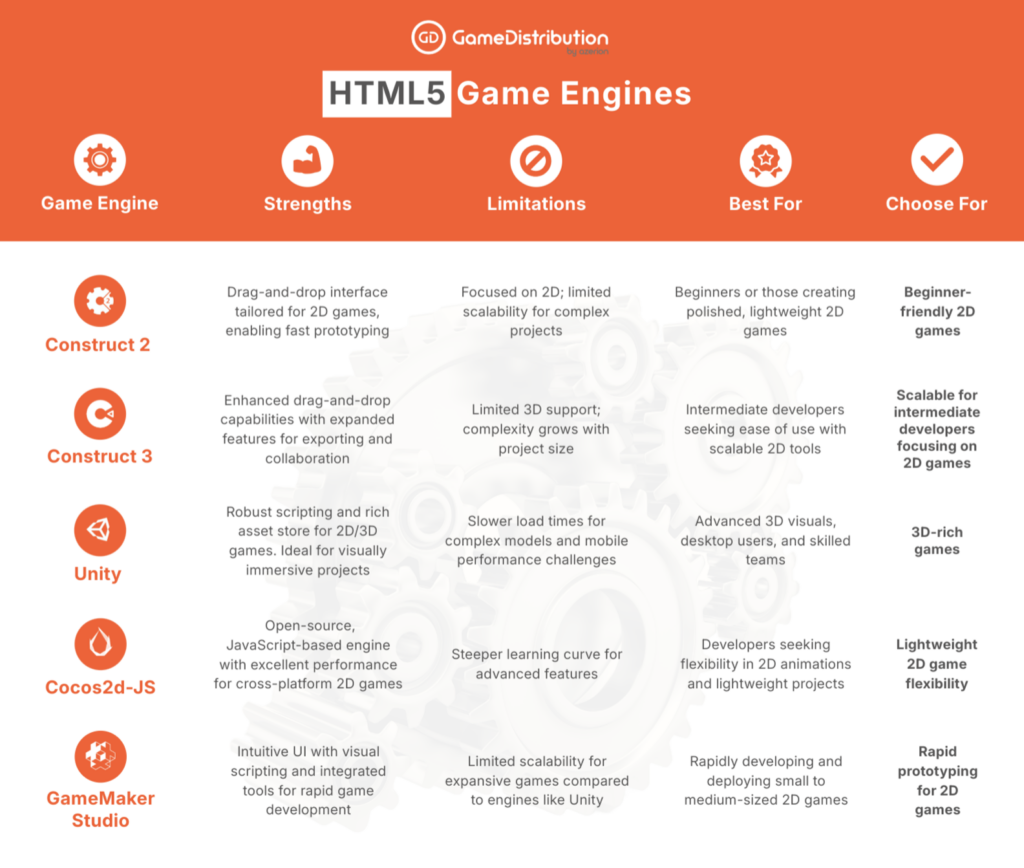HTML5 game development has transformed the gaming industry by providing a versatile, cross-platform solution for game creation. HTML5 allows developers to create games that run directly in web browsers without additional plugins or installations. This flexibility, combined with the advanced capabilities of modern browsers, has made HTML5 a top choice for game developers worldwide. This article examines best practices for HTML5 game development, covering the role of HTML5 game engines and tips for optimizing both user experience and revenue.
Section 1: Introduction to HTML5 Game Development
HTML5 game development involves creating games with HTML5, CSS3, and JavaScript. These platform-independent games run on any device with a web browser.
What is HTML5 Game Development?
HTML5 game development is characterized by its ability to produce games that run smoothly across various platforms without requiring players to download or install any additional software. This is possible due to the inherent features of HTML5, which include support for multimedia elements like audio and video, advanced graphics rendering via the Canvas and WebGL APIs, and robust interactivity through JavaScript.
The simplicity of deployment is one of the key advantages of HTML5 games. Developers can create a game once and deploy it across multiple platforms, ensuring that it reaches a broad audience. Additionally, the web-based nature of HTML5 games allows for easy updates and maintenance, making it easier to fix bugs, add new content, or improve performance.
Why Choose HTML5 for Game Development?
The choice of HTML5 for game development is driven by several factors:
- Cross-Platform Compatibility: HTML5 games can be played on any device with a web browser, eliminating the need for platform-specific development.
- Ease of Access: Players can instantly access HTML5 games without needing to download or install apps, which reduces barriers to entry and increases player engagement.
- Cost-Effective Development: HTML5 game development is generally more cost-effective than native app development, as it requires fewer resources and less time to reach multiple platforms.
- Rapid Development Cycle: The use of HTML5 game engines and frameworks accelerates the development process, allowing developers to bring games to market more quickly.
- Broad Market Reach: The web-based nature of HTML5 games means they can be distributed and shared across a wide range of platforms, including social media, messaging apps, and websites.
Section 2: HTML5 Game Engines
HTML5 game engines play a crucial role in the development process, providing developers with the tools and frameworks needed to create high-quality games efficiently.
Popular HTML5 Game Engines
There are several HTML5 game engines available, each with its own strengths and features. Some of the most popular ones include:
- Construct 2: Construct 2 is a user-friendly HTML5 engine that enables developers to build 2D games without programming. Its drag-and-drop interface and event-based logic make it ideal for beginners and indie developers.
- Construct 3: Construct 3 is a user-friendly game engine that allows developers to create games without writing code. It’s an excellent choice for beginners and those looking to create simple 2D games quickly.
- Unity: Unity is a powerful engine for creating both 2D and 3D games. It supports HTML5 via WebGL, making it ideal for developing complex games with immersive graphics for multiple platforms.
- Cocos2d-JS: Cocos2d-JS is a lightweight game engine that supports both 2D and 3D game development. It’s a part of the Cocos2d family, known for its performance and flexibility.
- GameMaker Studio: GameMaker Studio supports 2D and basic 3D development through a drag-and-drop interface and GML scripting. It’s popular among indie developers for creating polished 2D games that can be easily exported to HTML5.
Choosing the Best HTML5 Game Engine

Selecting the best HTML5 game engine depends on several factors, including the complexity of the game, the developer’s experience, and the desired platform. For instance, if you’re creating a simple 2D game, Phaser or Construct 3 might be ideal due to their ease of use and robust community support. On the other hand, if your game requires advanced 3D graphics, Three.js would be a more appropriate choice.
When choosing an HTML5 game engine, it’s also important to consider the engine’s performance, scalability, and support for monetization strategies. A good engine should provide smooth gameplay across different devices and offer tools for integrating ads, in-app purchases, and other revenue streams.
Section 3: HTML5 Game Development Best Practices
Creating a successful HTML5 game requires knowledge. Following best practices ensures games are engaging, fun, and optimized for performance and monetization.
Optimize for Performance
Performance optimization is crucial for HTML5 games, especially since they run in a web browser environment, which can be more resource-constrained than native applications. Here are some tips for optimizing performance:
- Use Efficient Code: Write clean, efficient JavaScript code to minimize the load on the browser. Avoid unnecessary calculations and optimize loops and conditions.
- Optimize Graphics: Use compressed images and sprites to reduce load times. Leverage texture atlases to minimize the number of draw calls, which can significantly improve performance.
- Leverage WebGL: When creating 2D or 3D games, consider using WebGL for rendering. WebGL offers better performance compared to Canvas by offloading rendering tasks to the GPU.
- Lazy Loading: Implement lazy loading for assets that are not immediately needed. This can help reduce the initial load time and improve the overall user experience.
Ensure Cross-Platform Compatibility
One of the main advantages of HTML5 games is their cross-platform compatibility. However, ensuring that a game runs smoothly across different devices and browsers requires careful testing and optimization:
- Test on Multiple Devices: Regularly test the game on a variety of devices and screen sizes to ensure consistent performance and appearance.
- Use Responsive Design: Implement responsive design techniques to adapt the game’s layout and controls to different screen sizes and orientations.
- Avoid Browser-Specific Code: Stick to standard HTML5, CSS, and JavaScript features that are supported across all modern browsers to avoid compatibility issues.
Focus on User Experience
A great user experience is key to the success of any game. Ensure that the game’s controls are intuitive, the interface is user-friendly, and the gameplay is engaging:
- Simple Controls: Design controls that are easy to understand and use, especially for mobile devices where touch input is the primary method of interaction.
- Engaging Gameplay: Focus on creating addictive gameplay loops that keep players coming back. Introduce challenges, rewards, and progression systems to maintain interest.
- Intuitive UI: The user interface should be clean and easy to navigate. Avoid clutter and ensure that important buttons and options are easily accessible.
Implement Robust Testing and Debugging
Thorough testing and debugging are essential to identify and fix issues before the game is released to the public:
- Automated Testing: Implement automated testing to quickly identify and fix bugs in the code. Tools like Jasmine or Mocha can be used for unit testing JavaScript code.
- Playtesting: Conduct regular playtesting sessions to gather feedback on gameplay, performance, and user experience. Use this feedback to make necessary adjustments.
- Error Logging: Implement error logging to capture and analyze errors that occur during gameplay. This can help in identifying and fixing issues more efficiently.
Section 4: Role of HTML5 Game Engines in Monetization

Monetizing HTML5 games offers unique opportunities and challenges due to their cross-platform nature. Unlike native apps, these games run in web browsers, reaching a wider audience. Monetization strategies, however, must align with the platform’s specifics.
The Role of HTML5 Game Engines in Monetization
HTML5 game engines are crucial for implementing effective monetization strategies. They provide the tools necessary to integrate ads seamlessly into games without compromising performance or user experience. For example, engines like Phaser and Cocos2d-JS offer built-in support for ad integration, allowing easier implementation of banner ads, interstitials, and rewarded videos.
Advantages of HTML5 Games for Monetization
HTML5 games offer several advantages when it comes to monetization:
- Wide Reach: The cross-platform nature of HTML5 games means they can reach a larger audience, including players on mobile devices, desktops, and tablets.
- Ease of Sharing: HTML5 games can be easily shared via social media, messaging apps, and websites, increasing their visibility and potential player base.
- Low Development Costs: Developing and maintaining HTML5 games is generally more cost-effective than native apps, allowing developers to maximize profits.
Tips for Effective Monetization
To maximize revenue from HTML5 games, consider the following best practices:
- Balance Ads with User Experience: Avoid overwhelming players with ads. A well-timed interstitial or rewarded video can be more effective than bombarding players with banner ads.
- Use Data Analytics: Leverage data analytics to understand player behavior and preferences. This information can help optimize ad placements and identify the most effective monetization strategies.
- Explore Partnerships and Sponsorships: Partnering with brands or sponsors can provide additional revenue streams while enhancing the game’s content and appeal.
HTML5 game development offers unique opportunities for creating and monetizing games that are accessible across a wide range of platforms. By following best practices in development, optimization, and monetization, developers can create engaging, high-quality games that not only attract a broad audience but also generate sustainable revenue. As the gaming industry continues to evolve, staying informed about the latest tools, techniques, and trends will be key to achieving long-term success in the HTML5 game development landscape.






